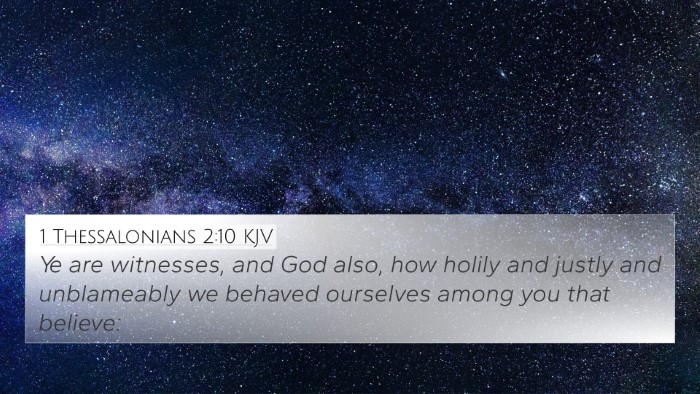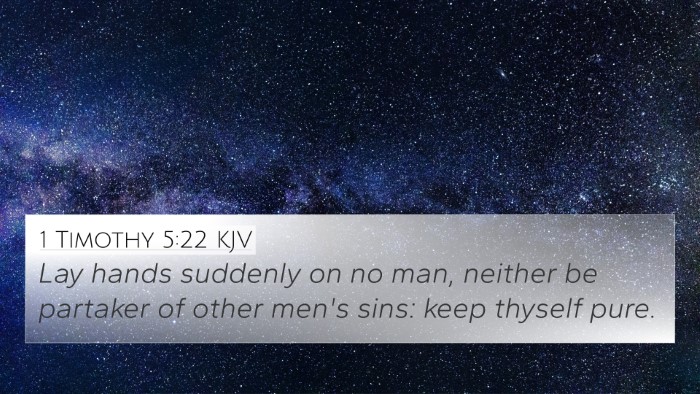Acts 20:26 states, "Wherefore I take you to record this day, that I am pure from the blood of all men." This verse is a profound declaration made by the Apostle Paul as he bids farewell to the elders of the church in Ephesus. His statement emphasizes his commitment to faithfully proclaiming the gospel, which imbues this verse with significant theological depth.
The meaning of this verse can be deeply understood through various public domain commentaries, which shed light on the implications of Paul's words.
Commentary Insights
- Matthew Henry explains that Paul's statement reflects his unblemished conscience regarding his ministry. He asserts that he has not failed to declare the whole counsel of God to the people. This emphasizes the importance of preaching the entirety of God’s message without withholding any crucial aspects.
- Albert Barnes states that Paul’s declaration serves as a form of self-justification. He underscores the necessity for leaders to be blameless and free from the blood of others, indicating their responsibility to shepherd their followers diligently. Paul is contending that he has faithfully fulfilled this duty.
- Adam Clarke further expands on this notion by relating it to the prophetic responsibilities found in the Old Testament. Clarke emphasizes that just as prophets were held accountable for failing to warn the people about sin, Paul holds himself accountable for not shying away from confronting the truth, presenting a parallel to the Old Testament prophets.
Theological Significance
The verse brings forth themes of accountability in ministry, self-examination, and the urgency of prophetic warning. For modern readers, this verse invites reflection on their own ministry, whether in preaching, teaching, or personal discipleship.
Cross-References to Acts 20:26
- Ezekiel 33:6 - Discusses the obligation of the watchman to warn the people, paralleling the theme of accountability found in Paul’s statement.
- Matthew 23:34 - Jesus mentions sending prophets to the people, highlighting the role of leaders in delivering God's messages.
- Romans 1:14 - Paul mentions his obligation to preach to all, emphasizing the universal call he feels as an apostle.
- 1 Thessalonians 2:4 - Paul speaks about being entrusted with the gospel, mirroring the responsibility he expresses in Acts 20:26.
- 2 Corinthians 5:10 - This verse speaks of judgment for our actions, which calls to mind Paul’s awareness and accountability for his ministry.
- 1 Timothy 4:16 - Here, Paul instructs Timothy to heed his doctrine closely, similar to the emphasis on careful ministry found in Acts 20:26.
- Hebrews 13:17 - Addresses the responsibilities of church leaders and their accountability to God for the souls they oversee.
- Acts 18:6 - Paul states that he is innocent of the blood of the Jews, reiterating the theme of accountability in preaching.
- 2 Timothy 4:2 - Paul instructs Timothy to preach the word, aligning with his own declaration of obligation to share the gospel.
- James 3:1 - This verse warns that teachers will be judged more strictly, reinforcing the gravity of Paul's statement regarding his purity from the blood of all men.
Understanding the Context
Understanding Acts 20:26 requires a contextual analysis of the entire chapter. In this poignant farewell, Paul reflects on his ministry in Ephesus, focusing on his intentions and actions. His strong emphasis on being "pure" from blood signifies the weight of his mission and the seriousness of neglect in delivering God’s message.
Connections between Bible Verses
The interconnectedness of various Bible verses can provide a richer understanding of the themes present in Acts 20:26. By engaging in comparative Bible verse analysis, readers can uncover profound meanings and increased commitment to the life of faith. Resources such as Bible concordances or a Bible cross-reference guide can facilitate this exploration.
Application for Modern Believers
For contemporary Christians, Acts 20:26 serves as not just a historical statement but a call for action. Reflecting upon the responsibilities inherent in any ministry—whether that be in formal leadership or personal engagement with others—becomes vital. It challenges believers to pursue integrity, fulfill their call, and remain vigilant in proclaiming the truth of scripture.
Conclusion
In conclusion, Acts 20:26 encapsulates a vital principle for all Christians: the importance of being accountable for their actions in relation to the divine commission received. By linking this verse with others through cross-referencing Biblical texts, believers can grasp a fuller understanding of their spiritual responsibilities. This verse's commitment and significance are timeless, highlighting the universal need to disclose, teach, and live out the richness of God's Word as witnessed in Paul’s ministry.















